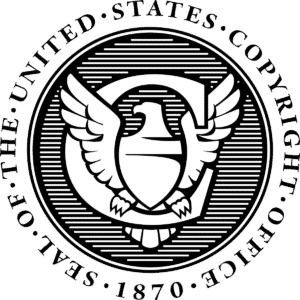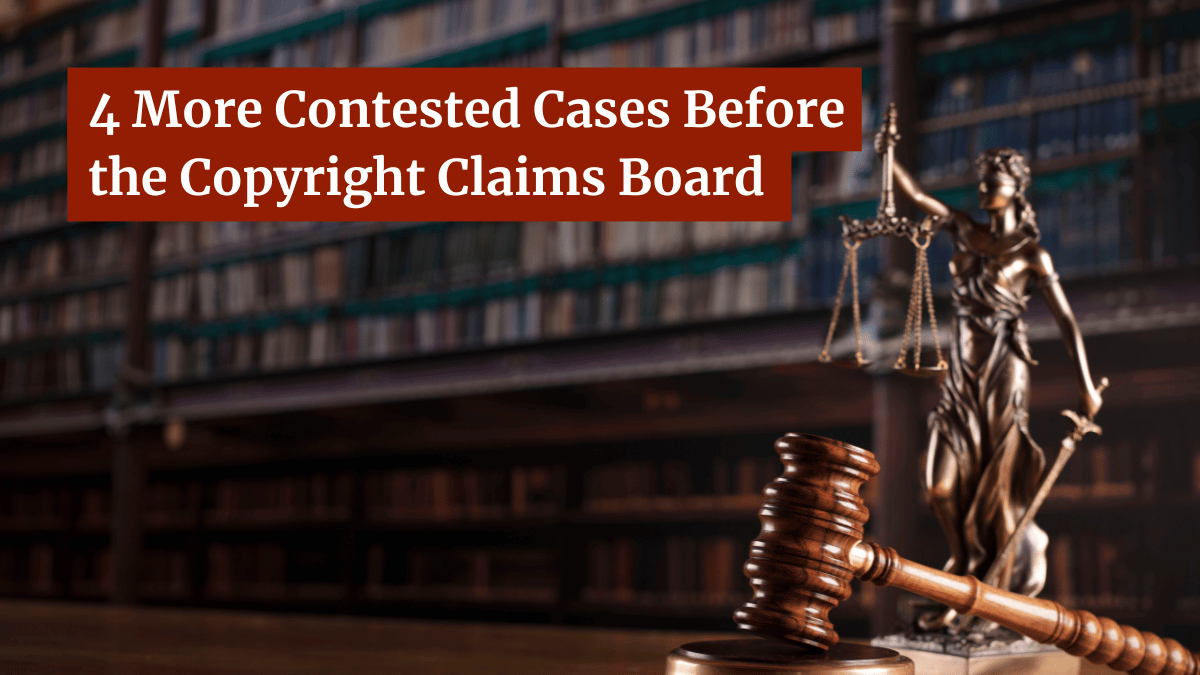4 More Contested Cases Before the Copyright Claims Board

The Copyright Claims Board, the recently established “Small Claims Court” for copyright cases in the United States, has now been open for roughly 18 months. In that time, over 700 claims have been filed with, encompassing a wide range copyright disputes.
However, the vast majority of those cases are resolved without the respondent saying a word. To date, only 46 of those cases have seen a claim response.
There are many reasons for this. Many claims are tossed for being improperly filed or inappropriate for the board, other cases fail to provide service to the respondent, once a respondent is served many of those respondents just don’t participate and default, others opt out and, of course, many cases are settled.
However, when it comes to contested cases, things have been clearly heating up. In the last three months, some 14 claim responses have been filed in 12 cases. While this isn’t a large volume for a regular court, for the CCB this represents a serious uptick in participation by respondents, in particular by businesses.
As such, it’s worth taking a few minutes to examine some of these cases and see what kinds of claimants and respondents are before the CCB and what kind of issues the board is being asked to address.
1: 23-CCB-0173 – Rackers v. Paramount Global
This case was originally filed in May 2023 by musician Luke Rackers. According to the claim, Paramount used a song of his entitled Forever Love in the streaming version of Cheers, Season 5 Episode 26 entitled I Do, Adieu.
In his claim, Rackers stated that he had not received a sync license and that the organization Paramount had claimed to have licensed the track through Music Dealers, never had the rights to the song. As such, he was seeking damages totaling $25,000.
However, Paramount Global responded. They didn’t deny that they used the song to replace another musical track for the streaming version, however, they claimed that they received a license from Music Dealers, which has since gone out of business, and that the claim was barred by the statute of limitations since the replacement happened 12 years ago.
Paramount did say that they were amenable to resolving the claim, but that Rackers was seeking an unreasonable amount of payment.
Shortly after the response was filed, Rackers requested a settlement conference and, in December, the CCB noted that the two sides had reached an agreement in principle to settle the claim. As such, it’s unlikely the CCB will issue a ruling on this case, but it is interesting to see Paramount participate in the CCB as a respondent.
However, that isn’t wholly surprising considering they participated as a claimant in June 2023.
2: 23-CCB-0149 – Shocked v. MacMillan Publishers, et al
This case was filed by musician Michelle Shocked, who we previously discussed in May 2023 (Note: That case is ongoing as well), alleging that the publisher violated the copyright to one of her songs, 5 AM in Amsterdam, in a book MacMillan published entitled I Live a Life Like Yours by author Jan Grue.
According to Shocked, the book uses six lines from the song in the book, which was originally published in the UK but has since been published in the US and is available in physical form as well as Kindle and audiobook.
MacMillan doesn’t dispute the facts of the case and, in their response, even uploaded the entire book to the public record. MacMillan, however, contends that this use is “quintessential fair use” as it was only a short passage from the song and represents a very small portion of the book.
In the book, which is a memoir, the author describes listening to the song at a meaningful moment of their life. The lines are quoted verbatim, but the passage is placed in blockquotes, and the song is attributed to Shocked. According to MacMillan, this represents a transformative use that causes no harm to the market for the original work.
As such, they argue that the use is a fair use and seek to have the case dismissed.
That said, MacMillan does seem to have a strong fair use argument. However, much of the case may hinge on whether similar uses of music lyrics are licensed and if Shocked can prove as such.
In this case, the claim response was just filed a few days ago and is the latest document in the docket.
3: 23-CCB-0143 – Poteet v. US Bowling Corporation
This case was filed by photographer Stefanie Poteet in April 2023. She alleged that US Bowling Corporation took four works of hers, all photographs of bowling alley signs, and used them in a collage that went above a home bowling alley installation.
That installation was featured on HGTV in an episode of Rock the Block and images from that installation were featured on the company’s website, featuring the company’s watermark.
US Bowling Corporation, in their response, did not deny the use of the images but claim that they had a “good faith” belief that the images were in the public domain since they found them on DeviantArt.
However, they did note that, after learning about the copyright issue, they quickly removed the work from their website. They also claim that it was not financially feasible for them to pay the requested license amount and claimed that the amount that Poteet wants is unreasonable.
In this case, the claim response was filed just over a month ago and is the latest document on the list. If the CCB decides this case, it will likely be a damages-only decision as the actual infringement seems clear cut.
That said, the amount of damages will likely depend on whether Poteet can prove that she has licensed the images in the past. As we saw recently, without such evidence the CCB is likely to award the statutory minimum of $750 per work, or a total of $3,000 in this case.
4: 23-CCB-0037 – Osuchowski v. Lewis, et al
The claim was originally filed by Charles Osuchowski in January 2023. According to the claim, Osuchowski was in a band named Obsidian with the three respondents. In his claim, he alleges that, during his time with the band, he created several pieces of artwork that the band used on various pieces of merchandise and promotional material.
He goes on to claim that he left the band in July 2022 and, after doing so, instructed the band to stop using the artwork that he had created. However, the band continued to do so, despite repeated warnings.
One the other hand, the respondents tell a very different story. In three responses that all say the same thing, the respondents make several claims including that they had permission from Osuchowski to use the artwork for years, that some of the works listed were not created by Osuchowski and, instead, were created by other members of the band and they are the incorrect respondents as the band formed an LLC while Osuchowski was still in the band.
As such, they argue that the LLC should be the respondent in the case, not the three individuals.
The CCB, for their part, has asked the respondents to file a joint response instead of three individual ones and has given them until February 6 to do so.
That said, this case deals with a lot of issues of fact that the CCB will have to sort through including who the creators of the work are, what terms the works were used under and, perhaps most importantly, whether it is the LLC or the individuals that should be the respondent.
On the latter point, as we’ve seen previously, the CCB has repeatedly refused to hold individuals liable if they can’t be directly linked to the alleged infringement. It will be up to Osuchowski to make that case.
This one seems likely to go to a CCB determination, if nothing else than due to how long and how heated this dispute has been going on.
Bottom Line
What is clear from all this is that the CCB will likely be handing down a (relatively) large number of decisions in 2024. As such, we’re likely to get a better grasp on how the board is approaching cases and the issues that they raise.
That’s important because the CCB, despite having seen over 700 filings, is still a very new tool for rightsholders to consider. How it rules and the analysis it performs will likely determine which rightsholders file with it and which go through regular courts.
This is a board that is still very much finding its place. However, the next year is likely to play a central role in determining how the CCB is used and what the future of the board looks like.
Want to Reuse or Republish this Content?
If you want to feature this article in your site, classroom or elsewhere, just let us know! We usually grant permission within 24 hours.
